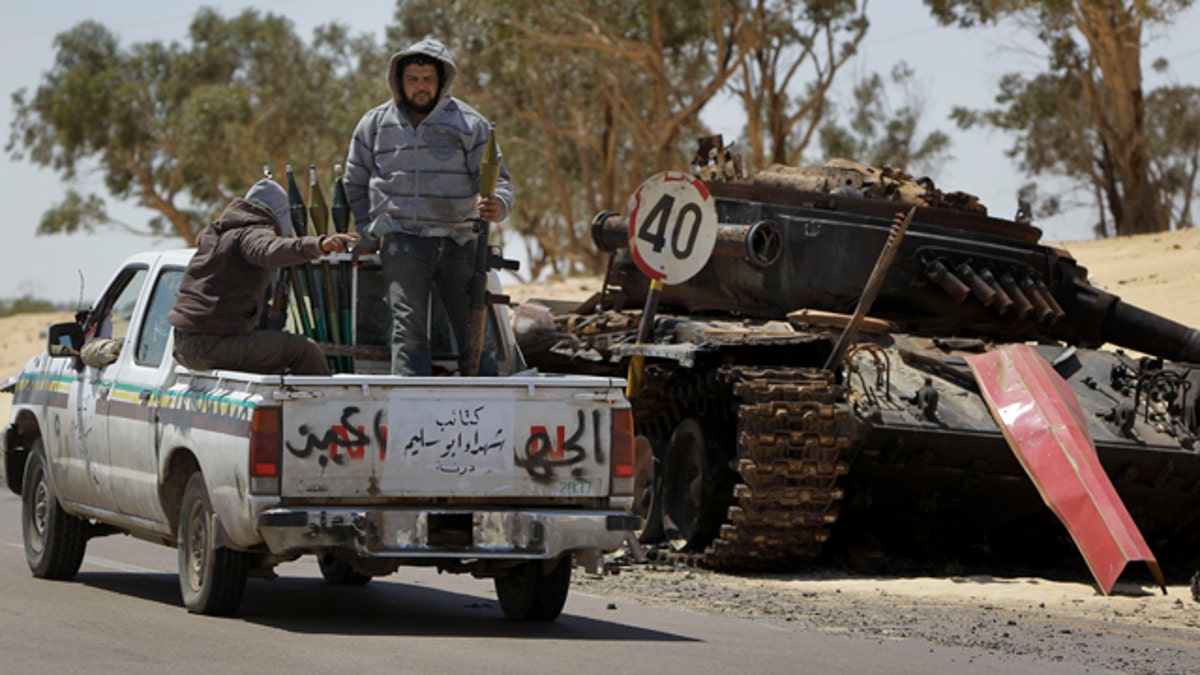
April 10, 2011: Rebel fighters armed with rocket propelled grenade launchers head back into Ajdabiya, past a previously destroyed pro-Gadhafi forces tank, during heavy shelling there, in Libya. (AP)
AJDABIYA, Libya -- Libyan rebels said NATO airstrikes on Sunday helped them drive Muammar Qaddafi's forces out of a hard-fought eastern city that is the gateway to the opposition's stronghold.
Four airstrikes largely stopped what had been heavy shelling of Ajdabiya by government forces, rebel battlefield commander and spokesman Col. Hamid Hassy said. NATO's leader of the operation said airstrikes Sunday destroyed 11 tanks near Ajdabiya and another 14 near Misrata, the only city rebels still hold in the western half of Libya.
Hassy said Qaddafi's forces fled the western gate of Ajdabiya and by mid-afternoon had been pushed back about 40 miles west of the city. Sporadic shelling, however, could still be heard in the area of western Ajdabiya.
The rebels claimed success as South African President Jacob Zuma and the heads of Mali and Mauritania arrive in Tripoli to try to broker a cease-fire. Qaddafi has ignored the cease-fire he announced after western airstrikes were authorized last month, and the government has rejected the rebels' conditions for a stop in fighting.
Government forces are trying to regain territory lost to the opposition following popular uprisings against Qaddafi's four decades of rule. They have been pounding Ajdabiya in their most sustained offensive since being driven back by international airstrikes last month.
If Qaddafi's forces took the city, they would have a clear path to Benghazi, the rebels' de facto capital about 100 miles away along the Libyan coast.
"If he controls Adjabiya, he makes us feel like we are unsafe because he can move anywhere in the east," Hassy said.
Residents of the embattled city of Misrata, the lone rebel outpost in the west of the country, said shelling continued Sunday, killing one and wounding two others seriously.
"We woke up at 7 a.m. from the tank fire," said a doctor working at the local hospital who spoke on condition of anonymity for fear of reprisal.
Libya's third largest city has been pounded without cease for more than a month by Qaddafi's heavy weapons, but the rebels have managed to hold out.
The apparent surge in ground fighting could add urgency to the latest peace initiative.
An official from the African bloc, Khellaf Brahan, said its proposals call for an immediate cease-fire, opening channels for humanitarian aid and talks between the rebels and the government. But it's unclear whether rebel leaders would agree to call off their attacks while Qaddafi remained in power.
The success of any peace initiative is also thrown in doubt by an international community bent on seeing the end of Qaddafi.
In an interview Sunday with CNN, former British Prime Minister Tony Blair said the objective should be to change the regime.
"We've got to keep in our minds, you know, what is our strategic objective," he said. "It is to get a different form of government in place in which the people of Libya decide the future of Libya.
In the capital Tripoli, the deputy foreign minister claimed government forces shot down two U.S.-built Chinook helicopters being used by rebel forces in the east of the country.
Khaled Kaim said the helicopters were shot down near the eastern oil facilities of Brega — a key objective of rebels — and accused NATO commanders of a double standard, allowing rebel forces to operate aircraft in "clear violation" of the U.N.-backed no-fly zone over the country.
"We have a question for the allied forces — is this resolution made for the Libyan government only or everyone in Libya?" he asked.
The report could not be confirmed with the rebels, but journalists in the area did describe seeing at least one helicopter apparently fighting for the rebels in the area Saturday, though it lacked the distinctive double rotor design of Chinook and appeared to be a Russian built model.
Most aircraft used by the Libyans, whether government or rebel forces, are Russian made, however, but the Directory of World Air Forces from 2008 says Libya had 20 Chinooks, which are used primarily for transport and heavy lifting, in service.
While the Libyan government forces still possess most of the military aircraft in the country, a few were taken by the rebels when some air force units defected in the east of the country following popular uprisings against Muammar Qaddafi's four decades of rule.
NATO, which enforces the no-fly zone said it has been has been applying it to both sides and on Saturday intercepted a rebel MiG-23 fighter jet and forced it back to the airport.
NATO forces also continue to carry out airstrikes against Qaddafi's forces, destroying 17 tanks and damaging nine others, the alliance announced Saturday.
Rebels have criticized the NATO for not giving them sufficient battlefield support as government forces continue to push into the east.
In Cairo, a Red Cross shipment of 1,100 pounds of medicine and health care equipment left for the Libyan border to aid Libyan refugees.
____
Al-Shalchi reported from Tripoli, Libya.
